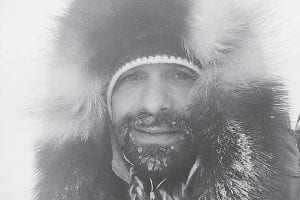On January 2, 2013, Lonnie Dupre of Grand Marais will once again begin his attempt to become the first person to climb Mount Denali alone in the coldest, darkest month of the year. As he goes he will take pictures that will be used in a documentary called Cold Love. Lonnie has also started an organization called One World Endeavors that he says he created, “to lead pioneering expeditions in the coldest regions of the globe as a means of advocating for these fragile environments which impact on the whole planet.”

Grand Marais resident Lonnie Dupre hopes his third solo try at climbing Mount McKinley (Denali) will be the charm, and he can successfully end his bid to become the first person to scale North America’s highest peak in January unaided and alone.
As he climbs Dupre hopes to chronicle the effects of global warming and experiment with the newest high tech batteries, electronics, and cold weather gear.
He said he also hopes to, “bring attention to the world’s receding glaciers.” Which might very well be attributed to climate change, he added.
Two years ago Dupre got off to a great start and climbed to 17,200 feet where he made camp and said he could see the 20,350-mountain peak. However, he was trapped in a small snow cave for six days while the mountain was buffeted by high winds and the temperatures plummeted.
When the weather finally cleared Dupre was cold, exhausted and running short on supplies, so he made his way back down the mountain.
In 2012 Dupre only made it as far as 15,400 feet before he was again trapped for seven days in a snow cave while the winter winds reached gale force. Coming down the mountain almost proved fatal as he was blown off of his feet by winds he estimated blew 80 mph. As he was sliding down Squirrel Hill he stopped himself with his ice ax in the nick of time.
“Another 10 feet and I would have been going too fast to stop my slide. It’s a 1,000 foot fall into Peter’s Glacier,” he said to the Cook County News-Herald last year.
Still, Dupre is ready to risk life and limb again. After traveling more then 15,000 miles over 25 years of Arctic exploration, some by dogsled, some by canoe/ kayak and some by hiking and mountain climbing, Dupre is one of the few people on the planet equipped with the skills and know-how to achieve this climb. He trains year round and has just completed high altitude training in Colorado and is now in Talkeetna, his base camp for the current summit attempt.
For much of his assent, Dupre, 51, cross country skis and pulls a 200-pound sled loaded with gear. The effort is exhausting and he needs to eat about 5,000 calories a day to keep his energy up. He also has to incorporate rest days as he gets used to the altitude. Dupre marks his trail with more than 250 bamboo wands and it can take him nearly a day to make a snow cave. Tents don’t work on the mountain because of the extreme winds.
Despite the effort to climb, Dupre will stop and gather microbe samples for Adventurers and Scientists for Conservation. The data will be used to help scientists understand how climate change affects the production of living matter in extreme environments. He will also collect other forms of microbe samples (rock from high evaluation on Denali) for researchers from Dragos Zaharescu from the Biosphere 2 project at the University of Arizona.
“The goal of my data collection is to help scientists understand how nutrient cycling is affected by climate change,” said Dupre, adding “Basically, this means we can began to understand how climate change will affect the production of living matter in extreme environments.”
Currently Talkeetna is in the throes of one of its coldest winters in a long time. But Dupre said he doesn’t mind cold, it’s the wind that has hurt him the last two times.
And if he doesn’t make it, once again he will have gathered important information and once again he will have tested his physical and mental limits on a mountain that so far has kept its peak just out of his reach.


Loading Comments